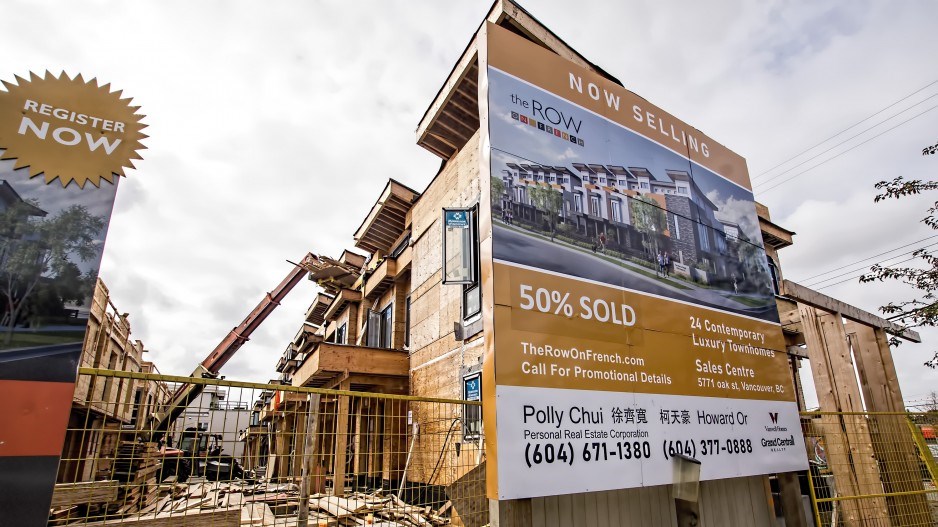The federal government's fiscal update has sparked disappointment among many who were hoping for big action on housing, including municipal leaders.
Canadian municipalities are particularly discouraged that the Liberals didn't include a new infrastructure funding model in the document released on Tuesday, despite the prime minister promising one would come in the fall.
The Federation of Canadian Municipalities says that new research it commissioned found municipalities would need $600 billion in infrastructure funding to help support the construction of 5.8 million homes by 2030.
That's the number of homes the Canadian Mortgage and Housing Corp. says Canada needs to build to restore affordability.
The federation held a news conference Thursday in Ottawa to call on the federal government to convene provincial, territorial and municipal leaders to discuss a new funding framework that takes economic and population growth into better account.
Municipalities say they need more money to build everything from roads to public transport to drinking water systems to support the construction of more homes, and they are turning to higher levels of government to pony up the funds.
"We don't expect that the federal government and the provinces will turn around on Saturday morning and write a check for $600 billion to fix this gap," said Mike Savage, mayor of Halifax and chair of the Big City Mayors' Caucus.
"What we do expect is that they accept that it's a real threat to the future of Canada, and particularly to its growth, and that they look at the things they can do."
Finance Minister Chrystia Freeland's fiscal update included few new housing policies, as the Liberal government acknowledges the pressure that high inflation and interest rates are putting on federal finances.
"We recognize the fiscal constraints that the federal government are under — provincial governments as well," Savage told reporters.
"But municipal governments are under even more fiscal pressure."
The Liberal government has generally taken a friendly approach with municipalities, opting to work with them on various priorities, including housing.
It launched a $4-billion housing accelerator fund program last summer, for example, which is giving cities with ambitious plans to boost housing construction the opportunity to apply for additional federal funding.
Savage acknowledged that the federal government has done a lot for cities, but said municipalities need more support to accomplish Canada's housing ambitions.
"We've had a pretty good relationship with this government over the last number of years," he said.
"They (were) elected, you'll recall in 2015, on a promise to go into debt to help fund infrastructure, including municipal infrastructure. So we don't disparage what the federal government (has) done. But we need more."
In a statement, Freeland's press secretary, Katherine Cuplinskas, said the fall economic statement was "squarely" focused on housing with billions in new investments to get more homes built. However, she did not address why the federal government hasn't presented a new infrastructure funding model for municipalities.
"The federal government is at the table with billions of dollars of support and expects what Canadians do as well — that all their elected officials work together to get more homes built, faster," she said.
Among the housing policies included in the fiscal update was an additional $15 billion in low-cost loans for rental developers, as well as $1 billion to build more affordable housing.
These measures were steps in the right direction, said Mike Moffatt, the senior director of policy and innovation at the Smart Prosperity Institute. But when it comes to housing policy overall, he said, the document landed as underwhelming.
"We are in a crisis. We've seen rents on new leases go up over 30 per cent in the last two-and-a-half years without any relief in sight. And I don't see much in here that will address or alleviate that situation," he said.
After the Liberal caucus retreat in London, Ont., in September, Prime Minister Justin Trudeau publicly committed to refocus his government's efforts on tackling housing and affordability challenges.
It was part of an attempt by the federal government to respond to the anger and worry that Canadians are feeling when it comes to the cost of living.
Since then, the government has announced a trickle of new measures meant to boost housing supply, including lifting GST charges on rental developments, unlocking more low-cost financing for projects and making more federal real estate available for housing.
Housing experts and advocates were hoping that it would carry that momentum into the fall economic statement, but they were ultimately let down by the limited scale of the policies.
Following the release of the fiscal update, Tim Richter, the president and CEO of the Canadian Alliance to End Homelessness, expressed concern about the absence of measures on homelessness.
"With affordability worsening, homelessness surging and the dream of home ownership continuing to slip away for many, the federal government must move more aggressively to solve the housing crisis," Richter said in a statement.
Moffatt said there's more the federal government could have done on housing that would not necessarily have cost a lot of money.
Among his suggestions were offering more tax incentives to developers and attaching more strings to dollars going to municipalities through the housing accelerator fund.
"I actually fear that the the government's assuming that ... the only policy lever it has is new spending. And I actually don't think that's the case," Moffatt said.
This report by The Canadian Press was first published Nov. 23, 2023.
Nojoud Al Mallees, The Canadian Press




